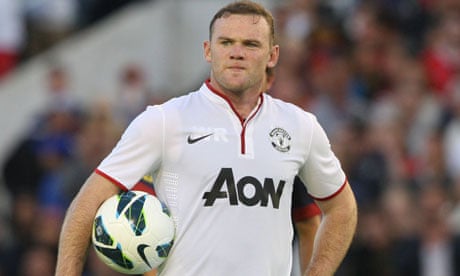England embark upon their latest World Cup qualification campaign in Moldovaon Friday but once again the finest domestic footballer of his generation will be missing. Indeed, Wayne Rooney has been awol from international duty for most of the past year, yet still he has never been out of the headlines.
The latest revelations, taken from his new book, have an uncanny timing, as the player himself raises concerns over his fitness and longevity at the top level. They arrive at a moment when many others are asking the same questions about Rooney's future, following his most recent injury and the arrival at Manchester United of his fellow superstar Robin van Persie. The gashed leg he suffered two Saturdays ago as a substitute in the 3-2 defeat of Fulham, a game for which he was dropped by Sir Alex Ferguson so that the former Arsenal striker could make his first start, has ruled him out for a month or more.
As a result Moldova, Tuesday's meeting with Ukraine and, possibly, next month's qualifiers with San Marino and Poland could all be yet more opportunities missed to increase his 29 goals from 76 caps. This injury is not Rooney's fault, of course. But a record of one completed England match plus appearances in only two more games in the past 12 months is. The red rage and recklessness that have pocked Rooney's career were to blame for the two-game suspension he incurred for stamping on a Montenegro player in a Euro 2012 qualifier last October.
The three appearances since were in a warm-up for those Championships with Belgium, the final group game in which Rooney scored the winner against Ukraine – his first tournament strike in eight years – and England's quarter-final penalty shoot-out defeat to Italy.
From his lacklustre performances this summer, and the previously disappointing displays at the World Cups of 2010 and 2006, a conclusion can be drawn that Roy Hodgson will be fortunate if his England side ever harness the barnstorming Rooney that terrified defences as a teenager at Euro 2004.
Ten years at the top of the Premier League hurly-burly is an exhausting length of time. Rooney began his personal decade as a precocious 16‑year‑old already built like a cruiserweight – and throughout the period has carried the fevered hopes of club, first Everton and then United, and country. This is bound to wear.
Extracts from Rooney's My Decade in the Premier League admit all this and more. They point to a player now conscious of his own mortality and who is perhaps aware that Ferguson is monitoring the miles clocked up by his prime forward. Explaining why he once turned up to pre-season training half a stone overweight, he says: "I drank a few bevvies while I was away. I'm stocky. I'm not like Ryan Giggs, all bone and lean muscle. But I gain weight quite easily. It's not a problem though. It's not as if the manager is leaning over my shoulder as the numbers come in, tutting and making jokes about me eating too many chip butties. Besides, I know I can shift it in a week or two."
But he goes on to say: "Physically I've taken a bit of a battering over the years; being lumped by Transformer-sized centre-backs or having my muscles smashed by falls, shoulder barges and last-ditch tackles, day in, day out, has left me a bit bruised. When I get up in the morning after a game, I struggle to walk for the first half an hour. I ache a bit. It wasn't like that when I was a lad. I remember sometimes when I finished training or playing with Everton and United, I'd want to play some more. But football has had a massive impact on my body because my game is based on speed, power and intensity."
Rooney is still England's best hope – he registered 34 goals for United last season, his best ever return. He is only 26. But an assessment of Ferguson's latest moves in the transfer market causes the seasoned United observer – and, probably, Rooney – to wonder if his 30th birthday will be marked at the club.
The £23m paid for Van Persie was primarily Ferguson's retort to losing the title to Manchester City on goal difference. But the Dutchman's arrival also secures United an indemnity. Beyond the goals, Van Persie's lean frame and low-maintenance personality persuaded Ferguson to pay a top price for a 29-year-old who has had his injury problems. The thinking here runs that if Rooney were sold in January or next summer for, say, £35m, then United would recoup the fee paid for Van Persie (plus an extra £12m or so) and remove his £250,000-a-week wage from the books, and the money could be reinvested.
How likely is Rooney to move on? Next summer he will be approaching 28 and will have two years remaining on the five-year deal signed in October 2010. United cannot afford Rooney's contract to enter its final season with his future undecided. If so, a sizeable whack is wiped off his sell-on value, and United face the prospect of a £27m player walking away for nothing in 2015.
The list of star operators moved on by Ferguson is well documented, including Mark Hughes, Paul Ince, David Beckham, Ruud van Nistelrooy and Roy Keane. While some of Rooney's unsavoury incidents at United include marital misdemeanours and urinating in the street, these have merely been distractions. It is his questioning of the club, allied to episodes of wayward discipline on the pitch, that have tested Ferguson's patience.
Rooney was awarded his latest contract after threatening to leave due to his claim that United lacked ambition. He said at the time: "I met with David Gill [the chief executive] last week [and] he did not give me any of the assurances I was seeking about the future squad. I then told him that I would not be signing a new contract."
Rooney duly signed, then apologised to United fans. But his relationship with supporters was weakened, and a sense of disappointment with him was felt throughout the game. When Rooney leapt into Premier League amphitheatres for Everton in 2002 he was the street footballer whose instinct and raw spirit was an unpackaged answer to the cosseted, cash-soaked modern player. After the 2010 contract negotiations he emerged with an eye-watering pay rise as just another product, a one-man corporation whose relationship with Ferguson was not the same, either, even if the manager has written the foreword to Rooney's new book.
The strain of their truce was illustrated last Christmas, when Rooney was suspended for a night out after a win over Wigan Athletic. He writes: "I'm happy at Manchester United, despite the downs that sometimes take place at a football club. Like when we stuff Wigan 5-0 on Boxing Day. I go out for dinner with a few of the lads, and our other halves, to a hotel. The next day, the manager pulls me and tells me he's not happy and doesn't feel I've trained properly. He fines me, but there's worse. I'm dropped for the next game, on New Year's Eve, against Blackburn.
"At a lot of clubs, people wouldn't bat an eyelid at players having a night out six days before a game. But that's the difference at Manchester United and a mark of the high standards the manager demands. It's a big deal, another lesson learned." Yet before those two disappointing displays for England at Euro 2012 he was pictured on holiday in Las Vegas when prudence might have guided him to be less visible.
Ferguson's strongest XI still has Rooney lining up behind Van Persie in a 4-2-3-1 formation, and there are few striking alternatives available for England and Hodgson. But time now ticks for Rooney. He also writes: "I know football is such a short career that one day, at any age, the game could be snatched from me unexpectedly. So I want to decide when I leave football, not a physio, or an opponent's boot."
Or, perhaps, these isles' greatest ever manager. One more intriguing aspect of the book is who penned the foreword – Ferguson. In doing so he gives the tome his and United's seal of approval. No doubt, this came from an urge to help celebrate one of more admirable best Premier League careers. And, the Scot, a canny political operator, may have also scanned the passages about fitness and the punishment taken by Rooney's body and considered here was one way to prepare the ground for his potential departure.

